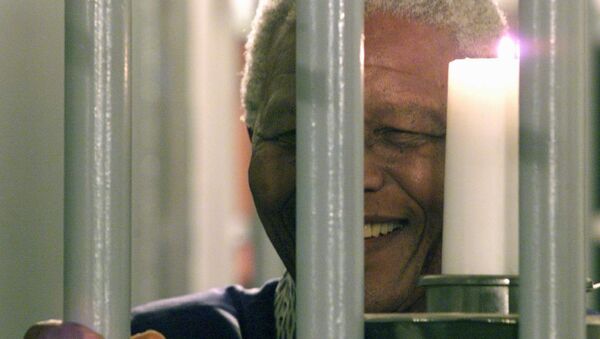Mabulu's work, featuring Mandela giving the Nazi salute and the words "Unmasked Piece of Sh*t," was briefly displayed at Johanesburg's FNB Joburg Art Fair before being pulled. The Nelson Mandela Foundation called the work "deeply offensive" and said it is considering legal action against the artist, saying the work "goes beyond the reasonable limit" of freedom of expression.
The Nelson Mandela Foundation has described Ayanda Mabulu's artwork as offensive associating Madiba with Nazi symbols. pic.twitter.com/p2NsWjeLMI
— Katlego Maseng (@KatlegoMaseng1) 10 сентября 2018 г.
Defiant, Mabulu told the BBC that "Mandela failed to deliver the dream" of equality, "and that makes him an equivalent of Hitler." "I do not have anything to apologize for," he stressed.
The artist's shock piece prompted strong reactions among Twitter users. While some wholeheartedly agreed with the Nelson Mandela Foundation's assessment, others agreed with Mabulu, accusing Mandela of betraying the anti-Apartheid cause and not touching the White minority's disproportionately large wealth. The debate soon degenerated into an argument about Mandela's origins, and his association with militants in the campaign against Apartheid in the 1960s.
Say what you about Mandela but he was never a mass murderer like Hitler he was never a Nazi this is not freedom of speech it's blatant direspect https://t.co/qw0OgFK75t
— I'm a bitter black woman (@Azola_AfroWoman) 11 сентября 2018 г.
Can't some legal charges be brought against this guy? I'm sure the Mandela family & or maybe the ANC can have a point of contention here?!
— MaMbele (@NolwaziMbele) 10 сентября 2018 г.
This is extreme. Mandela may have been a lot of things, but comparing him to a Nazi is over the top. https://t.co/yleaW8dkkj
— Knipho ♞ (@Knipho94) 10 сентября 2018 г.
Yah but thats not what people mean when they call others Nazis. A Nazi is someone who supports white supremacy. Mandela somehow did because instead of distributing the wealth he has meeting with the Oppenheimer's and the De Beers.
— Luhle's Mommy ♥️ (@darkskin_Nandi) 10 сентября 2018 г.
I'm sorry on this but I support his freedom of speech or expression on this one. Why is it that we should not interrogate the Mandela legacy and what it means to the black youth today…
— Yamhandinho (@ngqumz) 10 сентября 2018 г.
Many users emphasized that Mabulu was an "attention seeker," pointing to his previous controversial works, and urging fellow social media users not to get too carried away in their outrage.
The guy is an attention seeker and he always gets it by being controversial. Depicting Mandela as a NAZI will surely get the attention of the ANC and many people. He knows how to trigger emotions 😆😆 https://t.co/uM5t1V5JOq
— Floyd Nkuna (@AmuFloyd) 10 сентября 2018 г.
Nothing " new now ", except the level the idiot is prepared to descend to get noticed!
— Luís Noronha da Costa e Sousa (@LusNoronhadaCo4) 11 сентября 2018 г.
Just very poor taste. if you want to prompt controversy as an artist, you must first understand it. There was no understanding here, no relationship between the elements, no connection, no audience either, just cheap, juvenile disrespect screaming for attention. That's not art.
— Robert Bryant (@xbarx1) 11 сентября 2018 г.
Nearly a quarter century after the end of Apartheid, South Africa is in the grip of a new political crisis amid government efforts to expropriate land without compensation, with the campaign mostly targeting the country's minority white farmers. The expropriation initiative, justified by the government as an attempt to make up for the legacy of the country's discriminatory Apartheid-era laws, which enabled the country's white minority to accumulate some 72 percent of the country's farmland, have themselves been described as discriminatory. Some members of the white minority, which make up about 9 percent of the country, have warned that the land redistribution effort could lead to civil war.

